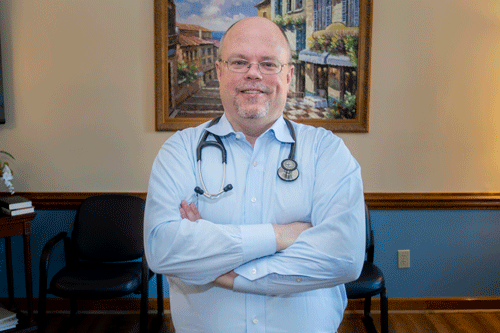Welcome!

Local doctor's COVID tale takes bad turn
ASHEBORO – Nearly eight months after the respiratory illness landed him in the hospital for five days in January, Dr. Jason Van Eyk is still battling COVID-19.
“I can’t even climb a flight of stairs without having to sit down and catch my breath,” the 46-year-old Asheboro physician said in a telephone interview last week.
Van Eyk says he was in good health before COVID-19. He explained that his body had a strong (and rare) immune response to the virus, which demyelinated nerves in his peripheral nervous system. “Basically,” he said, “my nerves got destroyed.” He calls himself “an outlier” among long-haul COVID sufferers, who experience symptoms days or weeks after a typical course of the disease. Specialists tell him it may take two years for his nerves to recover.
Among Van Eyk’s ongoing post-COVID symptoms are muscle pain, chronic fatigue, and excess secretions in his lungs and sinuses.
“I don’t want people to go through what I had to do,” he said. “I wouldn’t wish this on my worst enemy. In my lifetime, we haven’t seen anything like this.”
Before he tested positive for COVID-19, he had exhibited no symptoms, but he immediately quarantined for the recommended 10-day period. For nine days, he stayed home and watched a lot of television. Still no symptoms. He was eager to get back to work. His world had changed when he woke up on the 10th day.
“I couldn’t breathe,” Van Eyk said. “I couldn’t walk three feet.”
Van Eyk sees COVID-19 patients at his Asheboro practice COVID and in his work at Kindred Hospital-Greensboro, an acute care hospital.
He says COVID-19 is different for every person. An 80-year-old, who might be expected to face more severe problems, may experience an illness more like a common cold. Yet a 35-year-old – who falls into the age group for whom COVID-19 is typically less serious – may wind up in the hospital. At the hospital, he’s caring for COVID-19 patients in their 20s, 30s, and 40s, not just people in their 60s, 70s, and 80s.
The federal government is providing the vaccine free of charge to all people in United States. According to the Centers for Disease Control and Prevention, COVID-19 vaccines are effective against severe disease and death from variants of the virus that causes COVID-19 currently circulating in the United States, including the Delta variant.
Van Eyk advises patients to get vaccinated if they are at high risk from COVID. The high-risk group includes people 65 and older or people with certain medical conditions. He notes that overweight people are considered high-risk – and that most people in Randolph County would fall into that category.
“I’m telling everybody to get vaccinated if you’re high risk,” he said. “This is not anything to mess around with.”
